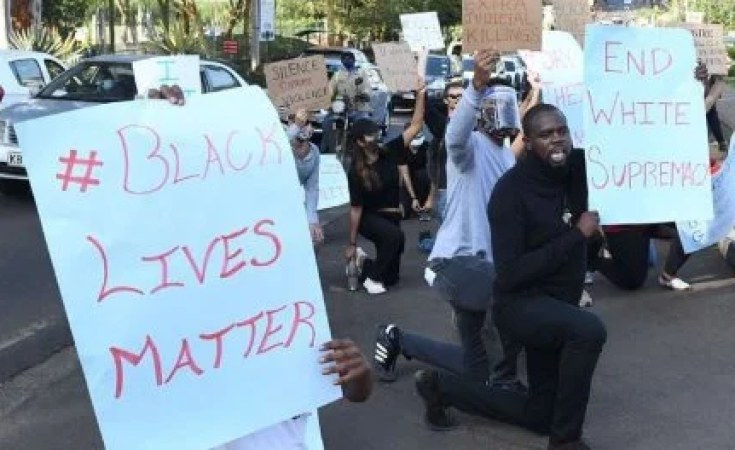8 minutes is the time it took police officer Derek Chauvin to tackle and keep a human being under his knee on the ground and deprive him of his most basic right, his life. His name was George Floyd, a 46-year-old African American and father of 2 children; he died victim of a police blunder and racial hatred against Black people in a country that defines itself as the land of freedom where everyone can live "the American dream".
This tragedy very painfully revives the debate on racism and police violence around the world. Suppressing forces or protecting services? Where does the legality of the legitimate use of violence end? These are questions among many others that every citizen can and must ask ourselves. How can we feel safe in the face of police officers who do not hesitate to use their weapons against civilians?
The world, thanks to social networks, watched in horror at this barbarism. It occurred on Monday, May 25, 2020 in Minneapolis in the state of Minnesota in the north of the United States. George Floyd left this world in a brutal and inhuman way; he died suffocated under the knee of a policeman. Neither his pleas, nor his cries of distress "I can't breathe", nor his invocations to his mother succeeded in moving or shaking his executioner Derek Chauvin, and his 3 team-mates Tou Thao, Thomas Lane, and J. Alexander Kuen. Four police officers who have, in the past, been indicted several times for violence.
Usually, we see this kind of violence only in fictions like Game of Thrones. But even in these cases, the bad guys end up paying. What shocked the most in the Floyd case was the dismissal of the four police officers in place of an immediate arrest and charge. America then caught fire; demonstrations degenerated into riots from West Coast to East Coast in the capital of each State to demand justice and to denounce police violence against Black people.
The value of the Life of a Black Man in the United States of America
George Floyd is one murder too many; this tragedy constitutes a new episode in the long and painful history of police violence against Black people in the U.S.; it painfully recalls the disappearance of so many others. Victims of police brutality such as Breonna Taylor, a 26-year-old paramedic shot in her home in Louisville, Michael Brown, an 18-year-old teenager killed by 6 bullets in Ferguson, Tamir Rice, a young 12-year-old boy killed in Cleveland, Stephon Clark, a young man shot in the back in Sacramento, etc.
Even today, America is grappling with an identity crisis that is deeply cracked by an institutionalized racial hatred towards the black people. It is quite difficult to imagine that just a few years ago a Black man named Barack Hussein Obama was elected president and served two terms.
Domino Effect to Denounce Racism and Police Violence
The whole world was horrified and revolted at such a display of hatred in a "free" and "democratic" America, an America which denounces the violence in the world castigating other governments for crimes and violations of the principles of human rights while crimes against a segment of its own population go unpunished. Beyond the United States, demonstrations echoed in other regions of the world, notably in Brazil to denounce police violence against the Black population in the Favelas, in France to demand justice for Adama Traore died in 2016 after his arrest, and in Africa at the impunity of police blunders.
Monopoly on the Legitimate Use of Violence
The police are an integral part of any society; it is the function of the State responsible for protecting its citizens. It is one of the institutions holding the monopoly on the legitimate use of violence. The tragedies due to police blunders everywhere reveal unambiguously the intrinsic threat to any society of this monopoly. Being invested with such a power should be considered a privilege to handle with care; and in no case as a right which is used and abused. It must incur responsibilities, including the obligation to report.
The Floyd affair revives the thorny question of the complicated relationship that the population maintains with the police. Clashes between police and citizens are increasingly marked by antagonism, violence and hatred. In my book Policing in Sub-Saharan Africa - The Weakest Link of Security Sector Governance, I argue that civil-police relations need much more attention, a new paradigm to rethink police work in society. The police deprived George Floyd of his right to life, his right to security.
But thanks to the rumbling of the street which has remained constant, America will not deprive him of his right to justice. Indeed, the prosecutor Keith Ellison in charge of the investigation of the case, finally resolved to reclassify the facts as intentional homicide, and the 4 police officers were charged. The impact of the Floyd murder heralds a new era in the fight against police violence in the United States and around the world. Serving and protecting, ensuring order and legally enforcing the law should be paramount to any police officer.
Dr. Fatoumata Sira Diallo is a freelance consultant, expert in International Relations and Diplomacy, Governance & Security researcher and author of the book State Policing in Sub-Saharan Africa - The Weakest Link of Security Sector Governance published by l'Harmattan.


